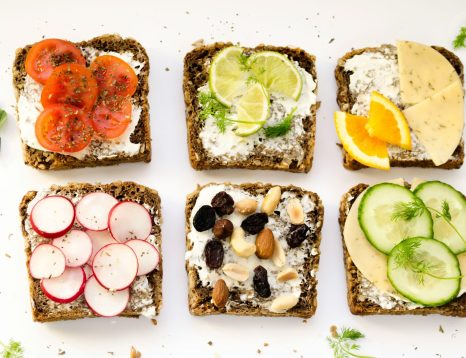
My name is Irini Kontopidou, I was born and raised in Thessaloniki. After the Panhellenic exams, I went to the Department of Nutrition and Dietetics at the Harokopion University of Athens. When I finished my studies, I continued with a master's degree in Chemistry at the University of Ioannina on Food Chemistry and Technology and I am currently a PhD candidate at the University of Western Macedonia in the Department of Obstetrics and I am preparing my PhD thesis on "Pregnancy and measurement of oxidant biomarkers stress", where we offer nutritional counseling to pregnant women who are trying to increase the intake of antioxidant components through their diet.
How did the interest in nutrition arise?
I have always loved the paramedical professions, and when it came time to do my computer science one of the schools I chose was Dietetics.. I was fascinated by how I could help other people both manage their weight and their health indicators proactively through their diet without the use of any supplements or other medication.
When did you start working professionally in nutrition?
I started in 2006 where I initially worked in a Wellness Institute and at the same time I was involved in education, teaching in Private and Public IEK as well as in Private Colleges. In 2011 I opened my own Dietetic office, with which I continue to this day and at the same time I have some collaborations with various organizations as well as I write articles on various websites and scientific magazines.
Nutrition is directly linked to weight loss. What other benefits can it offer to humans?
Certainly bad is directly linked only to weight loss. There is, in the impression of the world, the idea that dieticians are mainly, allow me the expression "slimming", but proper nutrition is not only that. A health specialist, such as a Dietitian-Nutritionist, can help a person to change his eating habits and through this change, which we aim to be forever, to be able to regulate his weight and prevent various diseases or to derive various health benefits. Surely we all know that nutrition is directly connected to our psychology, so the dietician is the health scientist who can help us disconnect emotion from nutrition, to eat balanced and get all the necessary nutrients, so nutrition, beyond from nourishment, to provide enjoyment. In addition, a balanced diet can help prevent and/or contribute to a level of treatment that can be combined with medication and help to treat and eliminate various diseases.
Given that there is insufficient information on the subject of proper nutrition, when do you consider it good to visit a dietitian-nutritionist?
Parents should definitely visit a nutritionist at some point in their children's lives, especially at school age, so that children can be informed about nutrition, along with nutrition programs that take place at various educational levels in schools. To do a body composition analysis - liposuction on the child and to find ways to include foods in the child's diet that he may refuse to try or eats occasionally. So the nutritionist can help them in how to introduce new foods into their diet but also how a program should be structured to ensure the necessary nutrients for the child. But even in adult life, someone should visit a dietician, so that there is a balanced diet that is adapted to their needs, their schedules, their preferences, as well as to suggest ways that they can eat out of the house and from fast food restaurants if a day there is no homemade food. The dietitian can suggest various recipes or tips to help an adult follow a more balanced diet. Also, if there is any nutritional health problem, such as some discomfort in the digestive system, constipation, some bowel disease, diabetes mellitus, hyperlipidemia, some allergy, and so he should limit some foods from his daily life and replace them with others nutrient equivalents. Also, women in pregnancy and breastfeeding can receive from the dietitian the appropriate nutritional instructions to protect both their own health, as well as the health of the fetus and later the newborn. We conclude that in all age groups visiting a dietitian can help us improve our diet.
As a mother and nutritionist, what diet plan would you recommend for healthy children?
Diet plans should always be individualized and based on the age of the children. The diet plan should match their needs, taking into account whether the child, but also the plan of the whole family. As a general plan, we can say that it should include all food groups. We do not exclude certain foods unless there is a proven health reason. We want there to be variety, we emphasize the proper hygiene of food, its proper handling, its quality and the choices children make. This nutritional plan should, of course, also include going out of the house or some invitations - festive treats that the child will receive at school or at birthday parties, but also nutritional education on how the child should behave there. This plan should include five to six portions of fruit and vegetables per day, fish once a week, legumes once, vegetables once or twice, pasta once and red meat once or twice a week. Finally, emphasis should be placed on eating breakfast as well as on children's proper hydration.
Is it possible to have a proper diet plan for all members of a family?
Yes, this can be done and the dietitian is the right health professional who can draw up such a diet plan so that there is the same basic food for all family members and it is adapted to the family's schedules, their preferences, in their lifestyle, as well as in their needs which may be met on average in different frequency and in different amounts depending on the family member. The nutritional plan is always created in collaboration with parents and taking into account all parameters, such as time availability, financial ability to buy food, ease or difficulty in cooking, adequacy of food available at home and access to food and services. That's why we usually take a very detailed nutritional history, in addition to the medical one, for the family members so that the program we will produce is as close as possible to their lifestyle, so that it is easy for them to follow it and maintain whatever achieve a good result after the nutritional intervention.
Is it true that nutrition can be used as a weapon to prevent and fight both physical and psychological diseases?
Yes, nutrition can contribute to the prevention of diseases, especially those related to the consumption of certain foods, such as hyperlipidemia, diabetes mellitus, anemia, constipation or other gastrointestinal diseases, as well as various types of allergies. It can also help fight diseases, but often diet alone is not enough. The diet provides around 10-20% to the therapeutic effect. However, in combination with medication and other therapeutic methods, it can contribute to the fight against diseases, mainly physical, but also psychological, because as we said, nutrition is directly related to our psychological state. This is where collaboration with a psychologist is needed because we must first treat this part, especially when eating disorders coexist, and then the dietitian intervenes so that there is a holistic approach and treatment of any issues.
Thank you very much.
Thank you too, keep up the good work.










